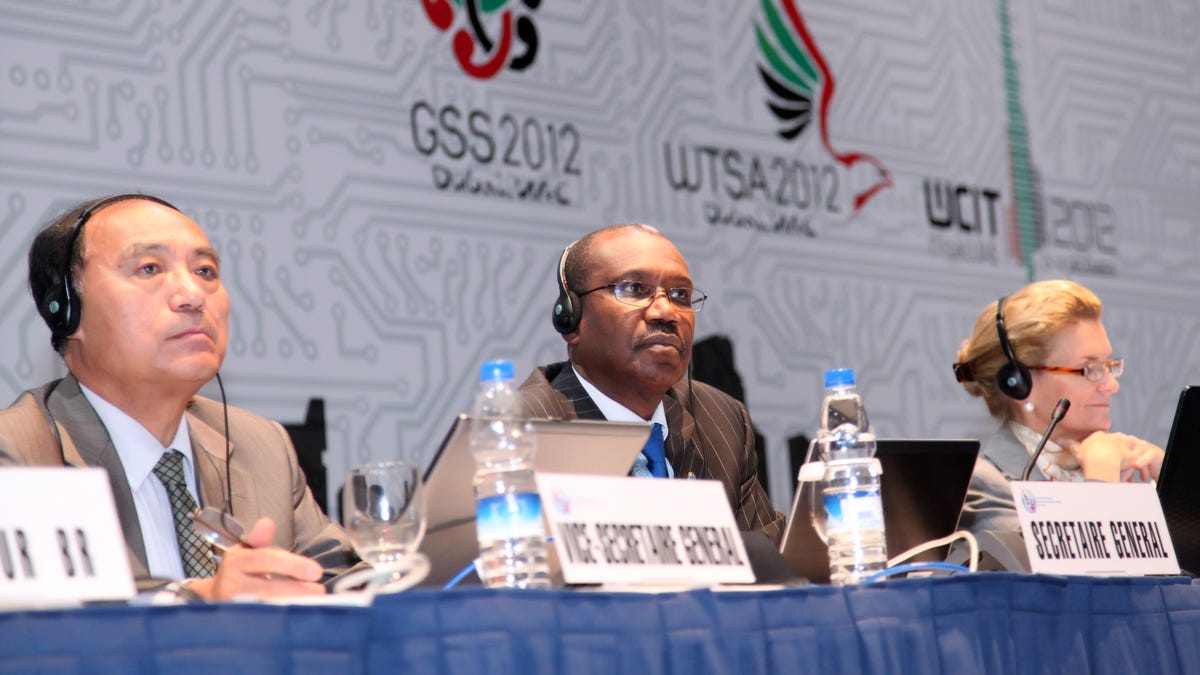U.N. proposal renews concerns of Internet power grab
Leaked document from U.N. agency shows it wants more involvement in "Internet-related technical, development and public policy issues." One critic says idea could have "deleterious effects" on the freedom of speech.

A United Nations agency has used a summit in Dubai to renew its efforts to gain more control over how the Internet is managed.
The International Telecommunication Union, a U.N. agency, has circulated draft language, which was leaked today, that would let the organization take what it describes as a more "active" Internet role in the future.
It shows that the ITU would become involved in "Internet-related technical, development and public policy issues" -- a broad phrase that sweeps in hot-button areas including cybersecurity, spam, surveillance, and censorship.
The draft document (PDF) was disclosed the same day as the White House reiterated its concern that the summit could lead to new telecommunications treaties that would invite more censorship by the more repressive nations that have sent delegations to Dubai. The White House said in a statement signed by cybersecurity coordinator Michael Daniel, Internet policy advisor R. David Edelman, and deputy U.S. chief technology officer Tom Power that:
The global consensus for a free and open Internet is overwhelming. Millions in the United States and around the world have already added their voices to this conversation, and their position is clear: they do not want the (ITU summit) to govern the Internet or legitimize more state control over online content. Our Administration could not agree more - and will not support a treaty that sets that kind of precedent.
Similarly, Sweden's delegate to the Dubai summit warned yesterday that the scope of the existing telecommunications treaties "should not be expanded and the Internet should not be included." Sweden added that "any debate on these issues, human rights, Internet, freedom of expression" should be "carried out in an open fora with the public and media present."
The proposals in the leaked ITU document, called DT/51-E, were quickly condemned by the Internet Society's Mexico chapter. ISOC Mexico said DT/51-E could have "deleterious effects on the freedoms of speech, of association, and of access to knowledge, which are clearly a matter of content and not infrastructure."
DT/51-E appears to have first been disclosed by a Web site called WCITLeaks.org that's run by two policy analysts from the free-market Mercatus Center at George Mason University in Arlington, Va. This evening, they posted another document (PDF) that provides more details.
Other portions of DT/51-E under discussion at this week's summit, called the World Conference on International Telecommunications, or WCIT, deal with regulating the "security of networks" and "bulk electronic messages."
DT/51-E also says national governments may, if they choose, manage the Internet's "naming, numbering, addressing and identification resources" -- a statement taking aim at the Internet Corporation for Assigned Names and Numbers, which oversees domain names, and ARIN and the other regional registries, which oversee the allocations of Internet addresses.
U.N. and ITU meetings often result in more rhetoric than substance. During a U.N. conference in Tunisia in 2005, for instance, Iran and African governments proclaimed that the Internet permits too much free speech, with Cuba's delegate announcing that Fidel Castro believes it's time to create a new organization "which administers this network of networks."
The difference this time is that the ITU summit, which ends Friday, is designed to rewrite the International Telecommunications Regulations (PDF), a multilateral treaty that governs international communications traffic. The treaty was established in 1988, when home computers used dial-up modems, the Internet was primarily a university network, and Facebook CEO Mark Zuckerberg was a mere four years old.
In a sharply partisan U.S. election year, sharp concern about the U.N. process has emerged as a rare point of bipartisan accord: the House of Representatives unanimously approved a resolution last week aimed at sending a strong message to the ITU. It said, in part, that "the consistent and unequivocal policy of the United States [is] to promote a global Internet free from government control."
Google has organized a campaign to draw attention to the summit, saying some governments "are trying to use a closed-door meeting in December to regulate the Internet." Advocacy groups Fight for the Future and AccessNow have launched WhatIsTheITU.org to warn that the ITU poses "a risk to freedom of expression" online. The Internet Society has told the ITU (PDF) that some of the proposals that could be inserted in the treaty will harm "the long term prospects of a global, open Internet."
Over the weekend, a Russian-led coalition that also includes China, Saudi Arabia, and the United Arab Emirates withdrew a proposal that would have gone even farther than DT/51-E.
Egypt was initially reported to be associated with the proposal, but yesterday its delegate said at the Dubai summit that the country "never supported" it. Egypt added:
Egypt has always supported and will continue to support the concepts of free Internet and has exerted all efforts to develop the Internet and its wide spread among its citizens. Content regulation and censorship are not within the scope of (the ITU) treaty... (It) should not impede multi-stakeholder institutions such as ICANN or ISOC from continuing its functions effectively, and should promote the continued vibrancy of the Internet and its impact on individuals and the society.
DT/51-E may complicate the political situation for Hamadoun Touré, the ITU's secretary general, who had pledged in his opening speech last week that the summit "is not about Internet governance."
A series of ITU committees are meeting to draft proposals, with a deadline of tomorrow. The final texts will be presented this Thursday, with the treaty signing scheduled to on Friday. Many of the meetings are being conducted behind closed doors, and key documents are withheld from public scrutiny -- the opposite of the way traditional Internet standards-setting works.

